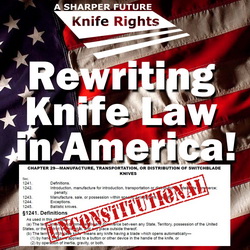
Knife Rights has filed a new federal lawsuit challenging the constitutionality of portions of the Federal Switchblade Act (Title 15 Chapter 29 §1241). Knife Rights’ original lawsuit was dismissed on absurd standing grounds back in June. As the deadline for filing for reconsideration or an appeal approached, we decided that it would be better to go with a fresh lawsuit. That decision was based an effort to, hopefully, minimize the total litigation time, and money, to reach a decision on the merits.
The new complaint has three additional plaintiffs, including a Native American who recently moved onto his reservation and can no longer legally possess a switchblade in his home on “Indian Lands.” In addition, we have developed an even stronger set of facts to address the bogus “non-enforcement” standing issue raised by the previous Court.
Despite the Government’s claim of no recent enforcement of the Act, as recently as 2020 the Feds staged a violent raid on a business that included forced entry into the home/business complete with use of flashbangs. The business owner was arrested, detained and questioned for hours, sustaining injuries in the process. Authorities seized/confiscated approximately 2.8 million dollars worth of switchblades and switchblade parts and shut down multiple retail websites, forcing the business to close. Sure seems like “enforcement” to us. How convenient they failed to mention that and the Court bought into their fairy tale.
However limited, or not, the Fed’s enforcement is currently, there is still no assurance that the Act will not continue to be enforced now and in the future. Not only did the Defendants fail to provide any assurance that the Act will not continue to be enforced, they cannot do so. Certainly, their purported limited enforcement is not “modest” or “limited” when viewed from those subject to raids, indictment, prosecution, and criminal and other penalties and consequences.
Originally enacted in 1958, the Act restricts the introduction into interstate commerce of common automatically opening (“switchblade”) knives. It also bans on their possession on Native American reservations and in U.S. territories. The definition of a “switchblade knife” includes gravity knives and butterfly knives.
Joining Knife Rights in the case are members Russell Arnold, Jeffery Folloder, Evan Kaufmann, Rodney Shedd, and Adam Warden and retailer members RGA Auction Services d.b.a. Firearm Solutions and MOD Specialties. They are represented by attorneys John W. Dillon at the Dillon Law Group and R. Brent Cooper at Cooper & Scully.
Named as defendants are Merrick Garland, Attorney General of the United States, and the United States Department of Justice. The lawsuit, Knife Rights, Inc. v. Garland, was filed in U.S. District Court for the Northern District of Texas.
In its complaint, the plaintiffs allege that the Federal government’s restrictions and bans are unconstitutional and said that “there can be no question that knives are “arms” protected under the plain text of the Second Amendment.…And indeed, the Supreme Court made clear in [NYSRPA v. Bruen] that the Second and Fourteenth Amendments protect the right to acquire, possess, and carry arms for self-defense and all other lawful purposes.”
This case does not challenge the Act’s import ban or the ban on ballistic knives.
Knife Rights Chairman Doug Ritter said, “It is annoying to have to file this lawsuit all over again, but I always expected this to be a long slog to eventual victory, so, it is what it is. Under Supreme Court precedent, the Federal Switchblade Act cannot pass muster and must be enjoined. The Federal government has no right to restrict interstate commerce in commonly possessed automatically opening knives of any type, or to ban their possession. After 66 years it is time to end this anachronism that was deceitfully enacted and which remains an insult to common sense.”
Since 2010, Knife Rights has led the charge to restore the right to keep and bear knives in 31 states, including repealing bans on civilian automatic (switchblade) knives in 19 states.
In its 2022 NYSRPA v. Bruen decision, the Supreme Court emphasized that the Second Amendment right to keep and bear arms is not “a second-class right, subject to an entirely different body of rules than the other Bill of Rights guarantees.” In 2021, Knife Rights filed an important amicus (friend of the court) brief to the Supreme Court that was cited in the Bruen decision.
Attorney John Dillon said, “The Federal Switchblade Act has always been constitutionally questionable, to say the least. After Bruen, there is no doubt this Act has been violating the Second Amendment rights of Americans for decades. Forty five states currently allow automatically opening knives to one degree or another, 36 with no restrictions whatsoever on possession. They are unquestionably common and therefore cannot be banned, either in interstate commerce or on Native American Reservations and U.S. territories. It is past time to free the switchblades.”
Stay tuned for the next installment of Knife Rights Unconstitutional Switchblade Bans Chronicles.
These court battles are primarily funded by the 501(c)(3) Knife Rights Foundation. Please consider making a TAX-DEDUCTIBLE donation to the Foundation to help us out. If you’d like to help support these lawsuits, please donate at KnifeRights.org/donate or call us toll-free at 866-889-6268 (10:00 AM – 5:00 PM Pacific).
Federal Switchblade Act Background
In 1950, a sensationalist article by a known hack journalist titled “The Toy That Kills” appeared in the Women’s Home Companion, a widely read U.S. periodical. The article sparked a storm of controversy. It ultimately led to a nationwide campaign by political opportunists of the day that would eventually result in a number of state laws restricting switchblade possession or carry and in the Federal Switchblade Act. You can read that article at: www.KnifeRights.org/TheToyThatKills.pdf
By the mid-1950s Hollywood’s fixation on the myth of the switchblade as the symbol of youth violence, sex, and delinquency resulted in demands from the public and Congress to control the sale and possession of such knives. State laws restricting or criminalizing switchblade possession and carry, of varying severity, were adopted by 24 states (16 of which have been repealed by Knife Rights’ efforts since 2010, plus 2 additional were eliminated in which Knife Rights’ active support helped it get done, for a total of 18 ). Only 14 of those states enacted full bans on switchblade knives, of which only 4 remain in force. In 1958 Congress passed the Federal Switchblade Act.
A more detailed history of switchblades and legislation against them can be found at: www.KnifeRights.org/Switchblade_History
BACKGROUND

Bruen upheld restrictions on weapons such as machine guns that are deemed by the court to be both “dangerous and unusual.” A weapon that is either not “dangerous” or not “unusual” cannot be prohibited. Automatically opening (“switchblade”) knives and other knife designs and opening mechanisms are neither “unusual,” being legal and common in most places today, nor any more “dangerous” than other non-prohibited knives or weapons. Knife bans existent today do not pass constitutional muster after Bruen.
Bruen also emphasized emphatically from the court’s prior Second Amendment McDonald decision that “the constitutional right to bear arms in public for self-defense is not a second-class right, subject to an entirely different body of rules than the other Bill of Rights guarantees.” Second Amendment decisions by courts must be made on the basis of strict scrutiny, just as with other rights. Intermediate scrutiny or “interest balancing” can no longer be used to decide Second Amendment cases. As such, the government can no longer defend knife bans because government doesn’t like a particular type of knife, for whatever irrational basis it comes up with.
Knife Rights is America’s grassroots knife owners’ organization; leading the fight to Rewrite Knife Law in America™ and forging a Sharper Future for all Americans™. Knife Rights efforts have resulted in 49 bills enacted repealing knife bans in 31 states and over 200 cities and towns since 2010.


